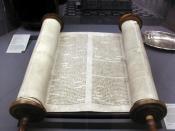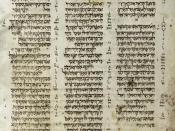Old Testament is a Christian name for the Hebrew Bible, which serves as the first division of the Christian Bible. The designations "Old" and "New" seem to have been adopted after c.A.D.; 200 to distinguish the books of the Mosaic covenant and those of the "new" covenant in Christ. New Testament writers, however, simply call the Old Testament the "Scriptures."
The Books of the Old Testament
Among contemporary Christians, the Roman Catholic Church recognizes as deuterocanonical several books that are consigned to the Old Testament Apocrypha by most Protestant bodies, whose canon conforms to that of the contemporary Hebrew Bible.
There the books follow the order of the Palestinian Hebrew canon, which appears to have been adopted by c. A.D.; 100, although most of the books had clearly received canonical status well before this time. The order is as follows: (1) the Torah or Law, the five books of the Pentateuch, i.e.,
Genesis, Exodus, Leviticus, Numbers, and Deuteronomy; (2) the Prophets, consisting of Joshua, Judges, First and Second Samuel, First and Second Kings, Isaiah, Jeremiah, Ezekiel, and the Twelve (or Minor) Prophets; (3) the Writings (Hagiographa), a heterogeneous group to which belong (a) Psalms, Proverbs, and Job, (b) the Scrolls (Megillot), consisting of the Song of Solomon (Song of Songs), Ruth, Lamentations, Ecclesiastes, and Esther, and (c) Daniel, Ezra, Nehemiah, and First and Second Chronicles.
The number of Old Testament books (not counting the Apocrypha) stands at 39; in the Hebrew Bible they are usually counted as 24. The discrepancy occurs because Ezra and Nehemiah are counted as one book, as are each of the following--First and Second Kings; First and Second Chronicles; and the 12 Prophets (Hosea through Malachi). Sometimes Judges and Ruth are also conflated, as are Jeremiah and Lamentations, making for 22 books, the...



Nice
you offer a lot of information, thank you
very helpful
0 out of 0 people found this comment useful.